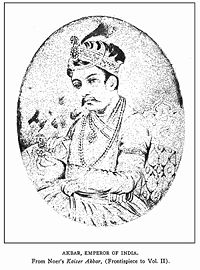Further...
Restoration
While previous Muslim rulers, in particular the Mughal founder Babur, did not allow freedom of worship for Hindus and other religious groups under their direct domain, Akbar engaged in a policy of actively encouraging members of the varying religious groups to enter his government. In the most critical instance, he persuaded the Kacchwaha Rajput Raja of Amber(modern day Jaipur) into a matrimonial alliance, Amber and Delhi being immediate neighbours, this merger proved to be a pivotal turning point in the history of the Mughal empire.
The other Rajput kingdoms soon established their matrimonial alliances with the Emperor of Delhi (although these was by no means the first instance of royal matrimony between Hindu and Islamic monarchs in India). The law of Hindu succession has always been patrimonial thus, the ancient linage of the Hindus were not loss in the process of marrying their princesses for political gains. Two major Rajput clans remained against him, the Sisodiyas of Mewar and Hadas (Chauhans) of Ranthambore. The Rajputs were of the Hindu warrior caste, the Kshatriyas, who, like the Afghans took opium prior to battle to invoke the god of war and vanquish the fear of death. Entering into an alliance with these kingdoms enabled Akbar to extend the border of his Empire to far off regions, and the Rajputs then became the strongest allies of the Mughals. For the next 130 years Rajput soldiers fought on behalf of the Mughal empire, until the Rajput rebellion during the reign of Aurangzab in which major hostilities arose between the Emperor of Delhi and the Rajputs of Rajputana, an imperative turning point which lead to the decline and eventual collapse of the Mughal empire following the death of Aurangzab.
In another turning point of Akbar's reign, Raja Man Singh I of Amber went with Akbar to meet the Hada leader, Surjan Hada, to effect an alliance. Surjan grudgingly accepted an alliance on the condition that Akbar did not marry any of his daughters. Surjan later moved his residence to Banaras.
However, Maharana Pratap of Mewar declined to accept Akbar's suzerainty and till the end was opposed to Akbar.
is recorded as saying "A monarch should be ever intent on conquest, lest his neighbours rise in arms against him", and he went on to expand the Mughal empire to include Malwa (1562), Gujarat (1572), Bengal (1574), Kabul (1581), Kashmir (1586), and Kandesh (1601), among others. Akbar installed a governor over each of the conquered provinces, under his authority.
Akbar did not want to have his court tied too closely to the city of Delhi. He ordered the court moved to Fatehpur Sikri, near Agra, but when this site proved untenable, he set up a roaming camp that let him keep a close eye on what was happening throughout the empire. He developed and encouraged commerce, in part by abolishing religious restrictions on the conduct of business between Muslims and Hindus.
Akbar's tax reforms were an especially noteworthy achievement, and formed the basis of the Mughal Empire's immense wealth in succeeding generations. His officials prepared a detailed and accurate cadaster (land register) noting each land parcel's soil quality, water access, etc., and then converted those characteristics to money, taking account of the different prevailing prices for various crops in each region of the Empire. This was a distinct improvement on earlier land tax systems, including the Egyptian and Roman ones, which had levied land taxes as an in-kind share of the harvest. By making land tax payments more accurately reflect the economic rent of the land in money rather than the actual harvest, Akbar's innovations had the effect of stimulating both investment in improvements and more productive use of the land. He also abolished the jizyah (a form of tax paid by non-muslims for their protection against any invading forces) and gave strict orders to prevent extortion by tax collectors. The salutary economic effect of these reforms was such that the revered Qing emperor Kang Xi adopted similar measures a century later in China, with similar success....👏
Personality
The court of Akbar, an illustration from Akbarnama
Akbar is said to have been a benevolent and wise ruler, a man of new ideas, and a sound judge of character.
To defend his stance that speech arose from hearing, he carried out a Language deprivation experiment, and had children raised in isolation, not allowed to be spoken to, and pointed out that as they grew older, they remained mute.[14]
Abul Fazal, and even the hostile critic Badayuni, described him as having a commanding personality. He was fearless in the chase as well as in the field of battle, and, "like Alexander of Macedon, was always ready to risk his life, regardless of political consequences". He often plunged his horse into the full-flooded river during the rainy seasons and safely crossed over to the other side. Though a mighty conqueror, he did not usually indulge in cruelty. He is said to have been affectionate towards his relatives. He pardoned his brother Hakim, who was a repented rebel. However, on some rare occasions, he dealt cruelly with the offenders, as is shown by his behavior towards his maternal uncle, Muazzam, and his foster-brother, Adham Khan.
He is said to have been extremely moderate in his diet. According to records, he was fond of fruits and had little liking for meat, which he ceased to eat altogether in his later years.
He is also considered as the most tolerant of the Mughal emperors as he repealed the jizya tax levied on Hindus. He was also much more religiously tolerant, compared to the other Muslim rulers that succeeded him.
[edit] Views on religion
At the time of Akbar's rule, the Mughal Empire included both Hindus and Muslims. Profound differences separate the Islamic and Hindu faith. When Akbar commenced his rule, a majority of the subjects in the Mughal Empire were Hindu. However, the rulers of the empire were almost exclusively Muslim. In this highly polarized society, Akbar fostered tolerance for all religions. He not only appointed Hindus to high posts, but also tried to remove all distinctions between the Muslims and non-Muslims. He abolished the pilgrim tax in the eighth year and the jizya in the ninth year of his reign, and inaugurated a policy of universal toleration. He also enjoyed a good relationship with the Roman Catholic Church, who routinely sent Jesuit priests to debate in his court.
Akbar built a building called the Ibdat Khna (House of Worship), where he encouraged religious debate. Originally, this debating house was open only to Sunnis, but following a series of petty squabbles which turned ugly, Akbar encouraged Hindus, Roman Catholics and even atheists to participate. He tried to reconcile the differences of both religions by creating a new faith called the Din-i-Ilahi ("Faith of the Divine"), which incorporated both 'pantheistic' versions of Islamic Sufism (most notably the Ibn Arabi's doctrine of 'Wahdat al Wajood' or Unity of existence) and 'bhakti' or devotional cults of Hinduism. Even some elements of Christianity - like crosses, Zoroastrianism - fire worship and Jainism were amalgamated in the new religion. Akbar the Great was particularly famed for this. Akbar was greatly influenced by the teachings of Jain Acharya Hir Vijay Suri and Jin Chandra Suri. Akbar gave up non-vegetarian food by their influence. Akbar declared "Amari" or non-killing of animals in the holy days of Jains like Paryushan and Mahavir Jayanti. He rolled back Jazia Tax from Jain Pilgrim places like Palitana. This faith, however, was not for the masses. In fact, the only "converts" to this new religion were the upper nobility of Akbar's court. Historians have so far been able to identify only 18 members of this new religion.
He also married several Hindu princesses, though many consider that to be politically motivated rather than a genuine attempt at religious reconciliation. However, he never allowed his female Muslim kin to be married to a Hindu prince. According to the Islamic ethos of the time, that would have been the only way to show tolerance or equality.
The Navaratnas
Akbar's court had Navaratnas ("Nine Jewels"), a term denoting a group of nine extraordinary people who have since become a part of Akbar's legend. Akbar's Navratnas were:
Raja Birbal - Prime Minister of the empire(Wazr-e Azam) and a brilliant administrator famous for his great wit and justness. Also one of the Emperor's closest friends, who had as a youth had come across Akbar during a hunt and impressed the Emperor with his wit, Birbal was born near Agra into an family of Kayastha official in the court of Hemu -The Vikramaditya who was defeated earlier by Behram Khan . His meteoric rise in the Mughal court was based on his sharp intelligence and the close bond between him and the Emperor. The Emperor was ever grateful to Raja Birbal and is said never to have taken a decision without the Grand Vizier's consent or advice. Although not a king, the title of Raja was conferred on him by the Emperor and he was declared the ruler of the capital territory of Agra. Birbal, along Akbar, is one of the most enduring figures of Indian folklore. Raja Bhagwant Das, Commander-in-Chief of the Mughal Armies Raja Man Singh - one of Akbar's most trusted Generals (son of Raja Bhagwant Das and brother to Prince Salim's patraani - Rajkumari Maanbai) Raja Todar Mal - the empire's Finance minister (Wazr-e Daftar) Mian Tansen - a Hindu singer who converted to the court faith, much beloved by Akbar who even called for him on his death bed. His voice could reportedly break glass with its pitch, and he had the ability to raise his voice to generate fires (much in the manner of the ancient Zoroastrian priests), as well as bring down rain when singing different raags like raag Malhar. Abul-Fazl - Official State Historian of Akbar's reign and author of Akbarnama, the court chronicle of the Emperor Akbar. He was also Minister for Armaments. Abul Fazl was one of the most scholarly and learned gentlemen in Akbar's court. Abdul Rahim Khan-I-Khana - the State Treasury Minister and an important noble. A renowned poet in Persian, Sanskrit, and Hindustani. Fakir Aziao-Din - This sage had no formal office, but was one of the chief advisors of the Emperor, along with the other Navratnas. - Faizi- Akbar's Poet Laureate who is best known for his Nal u Daman, a poetic rendering of the Sanskrit story of Nala and Damayanti.
[edit] Final years
mausoleum that houses the tomb of Akbar
The last few years of Akbar's reign were troubled by the misconduct of his sons. Two of them died in their youth, the victims of intemperance. The third, Salim, later known as Emperor Jahangir, was frequently in rebellion against his father, as some stories go, for his love of a courtesan named Anarkali. Asirgarh, a fort in the Deccan, proved to be the last conquest of Akbar, taken in 1599 as he proceeded north to face his son's rebellion. Reportedly, Akbar keenly felt these calamities, and they may even have affected his health and hastened his death, which occurred in Agra. His body was interred in a magnificent mausoleum at Sikandra, near Agra.
He wanted his sons to show their emergence of power, and whoever won the battle would be the king.
[edit] Akbar and Sikh Guru Amar Das
Akbar was a famous king of India. He was a kind and good king and respected the Sikh Gurus for their sensible practises and their fair and just teachings. In the year 1569, Akbar came to the Punjab and wanted to see the Guru.
So he sent a message to Guru Amar Das ji that he was coming to visit him. The Sikhs were very happy at the news. Some Sikhs thought that special arrangements should be made to welcome the king. But the Guru said, "Akbar is as much a human being as others are. The Guru's place is open to all. The king and his subjects, the Hindus and the Muslims, the rich and the poor are all equal here. So Akbar will be welcomed like all other visitors to the Guru's place and special arrangements need not be made."
"Caste has no power in the next world; Only the humble are exalted there. It is only the good who are honoured for good acts." ( Guru Amar Das in GGS ji – 469 ) The king, along with the Rajah of Haripur, arrived in Goindwal where the Guru lived. The Guru and a few Sikhs received them warmly. They were shown round the place. Akbar was interested to know how the Guru's Langar was run. Simple food was served to all in the Guru's Langar. It remained open day and night.
Travellers, beggars, and strangers, as well as the followers of the Guru, were all served with food. Whatever was left was thrown to the cattle and birds so that nothing was wasted. The Guru had given an order that all persons coming to visit his place must have their food in the Langar (when hungry). There they were to sit in rows (Pangat) as equals and were to be served simple food in turn. Akbar and the Rajah of Haripur took their meals in the Guru's Langar. They sat among the common people in a row and the Sikhs served them food. They enjoyed the simple food and were very happy. Akbar liked the working of the Guru's Langar very much.
Before leaving, Akbar said to the Guru,
"I like Guru Nanak's religion very much and I respect you for your teachings. I want to make a grant of land for running the Langar. Would you mind it!". The Guru replied,
"Dear Akbar, I am very glad you like the path of Baba Nanak. I am also grateful to you for your offer of a grant of land for the Langar, but I am sorry I cannot accept it because the Guru likes all to work hard to earn (Kirt Karni) and to share their honest earnings (Wand Chakna) with others, by giving something to the Langar from their honest earnings to help others. As such, the Guru's langar is the people's (Sangat's) Langar and it must be run on people's free gifts and not on a royal grant. That is why all share equally in the Guru's Langar and no one is looked upon as an outsider. In the Guru's Langar, each gives as much as we can spare and takes as much as he/she needs. Here, there is no difference between kings and beggars. All sit together; and eat simple food served with loving care." Akbar liked the Guru's idea very much.
Edited by nitica_82 - 17 years ago































9